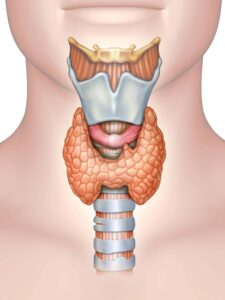Thyroid diseases become more prevalent as people age, so it is advisable to focus on preventive care. While these conditions cannot be cured, they can be effectively managed with medical intervention. Therefore, it is recommended to adopt preventive measures early on. By following basic principles of naturopathy and ensuring timely medical intervention, individuals can better prepare their bodies for aging.
Sometimes, these conditions may be accompanied by increased stress levels, although not everyone experiences this. Thyroid issues such as hyperthyroidism and hypothyroidism occur due to an imbalance of the thyroid hormone in the body. This hormone is released by the thyroid gland, which is located at the base of the neck and has a butterfly-like shape.
The thyroid gland plays a crucial role in regulating metabolism, heart rate, and the hypothalamic-pituitary-adrenal axis, which determines stress resilience. To maintain optimal functioning, the thyroid gland needs to secrete its hormones (thyroxine, triiodothyronine, and calcitonin) at the appropriate rate.
An underactive or overactive thyroid can lead to thyroid conditions that may require consultation with a naturopath or another primary healthcare practitioner. You can refer to the checklists below to identify the symptoms and assess whether naturopathic treatment and medicines are suitable for your situation.
It’s worth noting that although options like thyroid replacement therapy exist, they often involve the use of pharmaceutical products, which can have their own side effects. Fortunately, there are choices available for everyone, whether they prefer herbal medicine and other naturopathic supplements that can reverse thyroid dysfunction or opt for thyroid replacement therapy (which will be discussed later).
What is Hyperthyroidism (Overactive Thyroid)?
To understand what hyperthyroidism means, it helps to focus on the first part of the word, “hyper,” which implies excessive or overactive behavior. In the case of hyperthyroidism, the thyroid gland produces an excessive amount of thyroxine hormone, resulting in an overactive thyroid.
Now, let’s revisit the three hormones mentioned earlier. Thyroxine and triiodothyronine affect every cell in the body, as they regulate body temperature, the metabolism of fats and carbohydrates, and protein production. Calcitonin, on the other hand, regulates calcium levels in the blood. When the thyroid gland becomes overactive, these processes can become imbalanced, affecting overall bodily functions.
Supporting thyroid function is crucial, especially considering that thyroid disorders can also impact mental health.
Causes
The causes of hyperthyroidism are somewhat complex, so let’s break them down:
Graves’ disease: This autoimmune disorder is the primary cause of hyperthyroidism, accounting for 70% of cases. It often runs in families, and antibodies in the blood overstimulate the thyroid gland, leading to excessive hormone secretion. Treating Graves’ disease involves addressing the autoimmune disorder.
Thyroid nodules: The presence of lumps or nodules in the thyroid gland can also cause hyperthyroidism. When these nodules grow, they increase the release of thyroid hormones into the bloodstream. This condition is referred to as nodular or multinodular goitre.
Thyroiditis: This is a temporary condition in which the thyroid gland becomes inflamed and leaks stored hormones into the bloodstream. It occurs when the immune system is compromised or when the body is attacked by a viral infection. In this case, the thyroid gland itself is not overactive or compromised, but there is an excess of thyroid hormone in the blood during the viral infection.
To better visualize it, imagine a garden hose. Either the hose is functioning with excessive force or it’s working at its normal capacity but is leaking. In both cases, hyperthyroidism can be diagnosed.
Symptoms
Despite an increase or no change in appetite and food consumption, there is weight loss.
• The heartbeat becomes rapid, known as tachycardia (more than 100 beats per minute), or irregular, referred to as arrhythmia.
• The heart may feel like it’s pounding.
• Feelings of nervousness, anxiety, and irritability are present.
• Menstrual patterns become irregular.
• There is heightened sensitivity to heat.
• Bowel patterns undergo changes, particularly with more frequent bowel movements.
• Swelling occurs at the base of the neck in cases of goitre.
• Fatigue and muscle weakness are experienced.
• Hair and skin may become thinning

What is Hypothyroidism (Underactive Thyroid)?
As you might have already guessed, hypothyroidism occurs when the thyroid gland does not produce enough hormones. The insufficient secretion of thyroxine and triiodothyronine results in a slow metabolism and related symptoms. When there is a lack of thyroid hormones, the body’s processes begin to slow down. If left untreated, hypothyroidism can lead to obesity, joint pain, infertility, and heart diseases.
Causes:
The most common cause is an autoimmune disease where the immune system mistakenly targets the thyroid enzymes as harmful intruders. This prompts the immune system to attack these enzymes, leading to a decrease in thyroid activity. This condition is known as autoimmune thyroiditis and can manifest as Hashimoto’s thyroiditis or atrophic thyroiditis.
Similar to hyperthyroidism, one of the causes of hypothyroidism is thyroiditis. How can thyroiditis cause both hyperthyroidism and hypothyroidism? In the case of thyroiditis, stored hormones leak. If all the leakage happens at once and the entire supply of stored thyroid hormones enters the blood, it leads to a stage of hyperthyroidism. However, this is followed by hypothyroidism because the supply of hormones becomes insufficient, resulting in an underactive thyroid gland.
Other causes include the surgical removal of part or all of the thyroid gland, congenital hypothyroidism (when a baby is born with it), damage to the pituitary gland, and radiation treatment. Like hyperthyroidism, hypothyroidism can also be caused by inadequate or excessive iodine intake, which disrupts the balance of the gland. Lastly, unsupervised or inaccurate use of thyroid medication can also result in hypothyroidism.
Naturopathic doctors aim to identify the root cause of hypothyroidism and develop a personalized treatment plan accordingly. Our bodies respond differently to various treatments and medications, and naturopathic doctors take this into account when offering individualized treatment options.
Depending on factors such as nutritional deficiencies, autoimmune triggers, or other underlying causes, the naturopath will help determine the most suitable course of treatment for your body.
Symptoms:
• Fatigue and muscle weakness (similar to hyperthyroidism)
• Increased sensitivity to cold (in contrast to heat sensitivity seen in hyperthyroidism)
• Constipation (instead of frequent bowel movements as seen in hyperthyroidism)
• Dry skin
• Weight gain and a puffy face (as opposed to weight loss in hyperthyroidism)
• Elevated blood cholesterol levels
• Muscle aches, tenderness, and stiffness
• Irregular menstrual periods (similar to hyperthyroidism)
• Thinning hair (similar to hyperthyroidism)
• Slowed heart rate (as opposed to rapid heartbeat in hyperthyroidism)
• Depression
• Impaired memory
• Enlarged thyroid gland or goitre (similar to hyperthyroidism)
Natural Treatment for Thyroid Disorders:
Determining the underlying cause of the disorder is crucial. As naturopathic doctors in Ontario, we utilize various tests based on biomarkers to identify the imbalance or dysfunction in your thyroid gland. Following a naturopathic consultation and initial tests, we provide dietary recommendations (including a food sensitivity test) and suggest lifestyle changes. We also explain the natural therapies available to you.
A healthy diet that includes sufficient iodine, increased protein, and reduced alcohol, caffeine, and sugar can have positive effects as diet plays a significant role in regulating thyroid function.
For hypothyroidism, we test for microbiome imbalance and incorporate nutritional therapies such as probiotics and a low carb/sugar/carbohydrate diet to address autoimmune diseases if present.
Food allergy tests are conducted for thyroiditis, and vitamin deficiencies (such as B-12, selenium, and zinc) are corrected through the inclusion of foods rich in these nutrients.
To restore thyroid levels, naturopathic doctors specializing in digestive health may recommend herbs like Ashwagandha, Gum guggul, and curcumin, which have beneficial effects on metabolism, hormone conversion, and inflammation.
Our holistic approach aims to address the root cause of the disorder rather than just alleviating symptoms.

